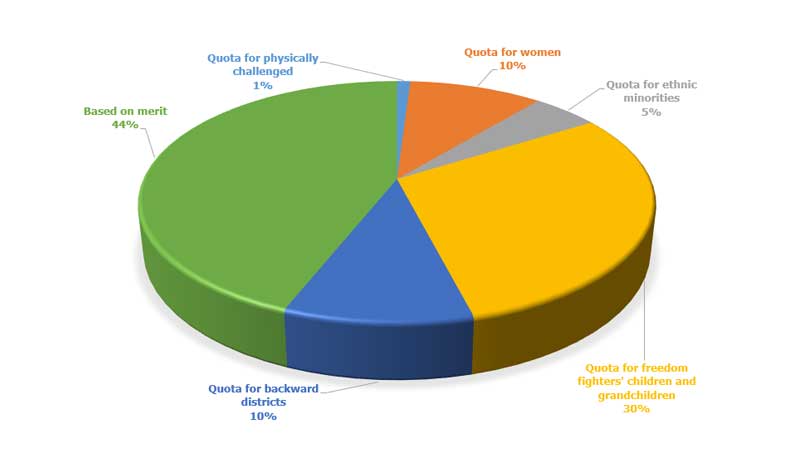Md. Irtaza Mahbub Akhond
Programme Associate (Communication), CPD
E-mail: irtazamahbub93@gmail.com
Quota system in jobs has been in practice for almost forever now. The question is, why has this become a major concern all of a sudden?
With more than one-third of the youth labour force being unemployed is obvious to generate frustration among the youth leading to demand for quota reform. Compared to many countries where education is made free, we take education as a way of generating revenue which previously caused “No VAT on education” movement. Education being expensive and the job sector almost offering nothing against such an ‘investment’ is not only a concern for individuals but should be a headache of the country as a whole.
Why do we call this situation to be a ‘dilemma’? In an effort to establish an equal society, quota system can be helpful in benefiting the left behind people. Such a system can be used for minorities and also for physically challenged people to participate in the labour force. The problem is not with the quota system, rather, how it is being used. With total allocation of 56% in various forms of quota, the question is certainly raised whether the more eligible candidates are being left out while trying to include left behind people. Thus, this situation creates a dilemma of whether to keep the system or to abolish it.
The ongoing movement is in favour of reforming the quota system rather than just abolishing it. The reform to a greater extent questions the 30% quota reserved for the heirs of freedom fighters. This surely makes way for a big debate. Many would argue in favour of upholding this as the freedom fighters have surely given us our existence. The benefit given to the children of freedom fighters makes sense. They needed that extra advantage as many families of freedom fighters struggled for a long period after the war. However, carrying it further for their grandchildren looks lacking a proper reasoning.
The biggest question that remains is, what to do with this ongoing movement and how to reform this system? The answer might be easy as one might feel that the court can just pass laws to reduce the amount of quota for certain groups. Just as easy it might seem, the decision making process can be much more difficult, especially as the election is nearing. Prioritising is not easy when choosing between young voters looking for decent employment opportunity and people solely driven by the sentiment of liberation war.
It is probably time that we look into the problem as a concern for the country’s future. Surely we exist because of the courageous people who fought in 1971, but we cannot just let our future go astray by living in the box filled with emotion only glorifying the past. Quota system needs to exist but it needs reforms as per the need of the current market demands. If the country prospers with the youth actively participating in the labour force, it is not just one election that one can be benefitted from.



